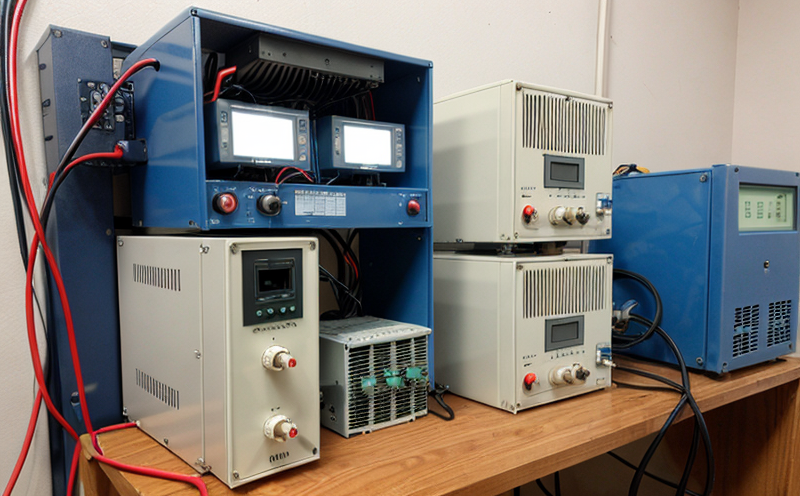Electrical & Power Supply Systems Testing
The electrical and power supply systems testing is a critical aspect of ensuring the safety, reliability, and compliance of railway and transportation equipment. These systems are responsible for providing reliable power to various components such as traction motors, signaling systems, braking systems, lighting, communication devices, and more. The integrity of these systems directly impacts the performance and maintenance requirements of railway infrastructure.
The electrical and power supply systems testing can be broadly categorized into several key areas: insulation resistance measurement, ground fault detection, short circuit protection, overcurrent protection, harmonic distortion analysis, voltage regulation monitoring, frequency stability assessment, and power factor correction evaluation. Each of these tests is crucial for ensuring that the electrical and power supply systems meet stringent safety requirements.
During the testing process, specimens are carefully prepared to ensure accurate results. This may involve isolating specific components or entire systems under test conditions. Specialized apparatus such as insulation resistance testers, ground fault detectors, short circuit simulators, harmonic analyzers, voltage regulators, frequency stabilizers, and power factor meters are used to conduct these tests.
The testing process is designed to simulate real-world operating conditions as closely as possible. This includes applying realistic loads, temperature variations, and environmental factors that the systems may encounter in service. By doing so, potential issues can be identified early on, allowing for timely corrective actions to prevent failures during critical operations.
Compliance with international standards such as ISO 12106-1:2019, IEC 61853-4:2016, EN 50173-2.1:2017, and ASTM E1600-18 is essential to ensure the reliability and safety of electrical and power supply systems in railway applications. These standards provide a framework for testing procedures that are widely recognized and accepted by regulatory bodies around the world.
Testing also helps identify potential issues before they escalate into larger problems, which can lead to significant cost savings and operational efficiency improvements. By adhering to rigorous testing protocols, railways and transportation companies can ensure their systems meet not only current but future safety requirements as well.
The importance of electrical and power supply systems testing cannot be overstated in ensuring the safe operation of railway networks. Proper testing ensures that all components work together seamlessly under various operational conditions. This is particularly important given the increasing complexity of modern rail vehicles and infrastructure, which rely heavily on integrated electronic controls and power distribution networks.
By leveraging advanced technology and adhering to best practices outlined in relevant standards, railways can maintain high levels of safety and reliability while minimizing disruptions caused by equipment failures or malfunctions. Investing in thorough testing programs also supports long-term asset management strategies aimed at extending the useful life of critical infrastructure assets.
Applied Standards
The application of relevant international standards is crucial for ensuring consistency, accuracy, and reliability across different jurisdictions when conducting electrical and power supply systems tests. Key standards that guide this process include:
- ISO 12106-1:2019: This standard specifies the requirements for insulation resistance testing of electrical equipment.
- IEC 61853-4:2016: It provides guidelines on ground fault protection in low-voltage circuits.
- EN 50173-2.1:2017: This European standard covers the electrical characteristics of railway supply networks.
- ASTM E1600-18: Focuses on the evaluation and verification of power quality in industrial settings, which is equally applicable to railway environments.
These standards provide a comprehensive framework for conducting thorough tests that cover all relevant aspects of electrical integrity and performance. Compliance with these standards ensures consistency in methodology and interpretation throughout various phases of testing.
Furthermore, adherence to such standards demonstrates commitment to quality assurance practices which are increasingly becoming mandatory requirements set forth by regulatory authorities worldwide. This not only enhances confidence among stakeholders but also facilitates smoother interactions between different parties involved in the supply chain.
International Acceptance and Recognition
The railway industry operates on an international scale, requiring consistent standards that are recognized globally to ensure interoperability and safety across borders. Electrical and power supply systems testing falls under this umbrella, with several key organizations and initiatives promoting uniformity:
- IEEE (Institute of Electrical and Electronics Engineers): Offers guidelines for the design, installation, operation, maintenance, and protection of electrical installations.
- IEC TC 28: Responsible for developing international standards related to low-voltage electrical equipment.
- CENELEC (Comité Européen de Normalisation Electrotechnique): Develops harmonized standards for the European market, ensuring compatibility and interoperability within Europe.
- UNECE (United Nations Economic Commission for Europe): Provides recommendations for vehicle type approval including electrical systems.
The widespread acceptance of these international standards signifies their importance in maintaining high-quality testing practices across diverse environments. By aligning with these benchmarks, laboratories ensure accurate and comparable results which are respected internationally.
Recognition from such bodies lends credibility to test reports generated by accredited facilities like ours. This recognition not only enhances trust but also facilitates smoother collaboration between different regions involved in railway projects.
Competitive Advantage and Market Impact
The ability to provide robust electrical and power supply systems testing services offers significant competitive advantages for businesses operating within the railway sector. Here are several ways this capability impacts market performance:
- Enhanced Reputation: Compliance with stringent testing protocols enhances an organization's reputation as a leader in quality assurance, thereby attracting more clients.
- Innovation Support: Access to state-of-the-art facilities enables continuous improvement and innovation within the field of railway electrification technology.
- Cost Efficiency: Early identification of potential issues through thorough testing can prevent costly repairs or replacements later on, thus improving overall cost management.
- Regulatory Compliance: Ensuring adherence to international standards helps organizations navigate complex regulatory landscapes more effectively.
- Better Risk Management: Comprehensive testing strategies help mitigate risks associated with electrical failures, contributing to safer operations.
- Promoting Interoperability: Adherence to recognized global standards ensures that railway systems can operate seamlessly across different countries and regions.
By focusing on these areas, companies not only meet but exceed expectations set by customers and regulatory bodies alike. This approach fosters long-term relationships based on trust and reliability, ultimately driving sustained growth in the market.





